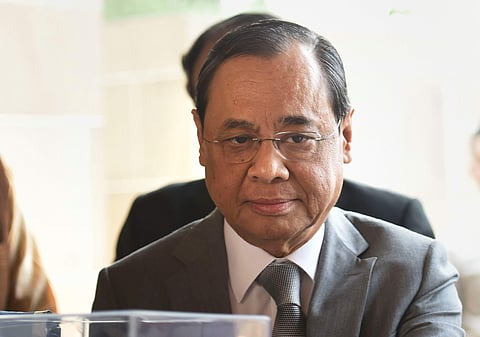

GANDHINAGAR: Underlining that respecting the unity and integrity of the country is perhaps the "most important fundamental duty", former Chief Justice of India Ranjan Gogoi on Monday said enough protests have been held on the new citizenship law and that people should not create "two parallel forums" when the SC has already seized the matter.
Addressing students of the Gujarat National Law University (GNLU) here, the former CJI also said that everybody has the right to express views on the Citizenship Amendment Act (CAA), but "the resolution of the issue must be through Constitutional means".
Referring to the protests over the CAA in his home state Assam, the former CJI said there were elements who wanted to harm the integrity of the country, but the student community there called off the violent protests within days, which improved law and order situation overnight.
"Perhaps the most important fundamental duty is the respect of the unity and integrity of the country. There are issues in this, and why hype them. The Citizenship Amendment Act. It is an issue. You may have a view about it, I may have a view about it, and our views may not match. I have the right to express my view, you have the right to express your view. Fine. But the resolution must be through Constitutional means," he said.
Former CJI Gogoi further said the matter (challenge to CAA) is pending before the supreme court.
"Trust your judges. They will decide, according to the Constitution," he added.
Several petitions have been filed challenging the constitutional validity of the Act including by RJD leader Manoj Jha, Trinamool Congress MP Mahua Moitra and AIMIM leader Asaduddin Owaisi.
"Protests have been held, viewpoints have been expressed. Enough. You cannot have two parallel forums, the Supreme Court and someone else," he said.
On December 18, the apex court had agreed to examine the constitutional validity of the CAA, but refused to stay its operation.
Assam was the first state where protests broke out after the CAA was passed by Parliament in December last year.
The newly amended law seeks to grant citizenship to non-Muslim migrants belonging to Hindu, Sikh, Buddhist, Christian, Jain and Parsi communities who came to the country from Pakistan, Bangladesh and Afghanistan on or before December 31, 2014.
Referring to students' move to call off the protests in Assam, the former CJI said he had not yet seen such "constructive role" played by students.
"The protests over the CAA were initiated from my state (Assam), because the problem of my state is different than the problems in the rest of the country. I had just retired and reached Guwahati. All of a sudden, there were protests."
"After five days of intense problems, the student community spearheading (the agitations) said we will call off our protests at 5 in the evening. No more protests. The law and order became all right overnight. This is the role of the students," he said.
"I am yet to see a more constructive role played by students," the former CJI said.
"The moment they did it (called off the protests), there was no more violence, there was no law and order issues. People were protesting, yes, but without violence. What is the moral of the story? There are elements who want to harm the integrity of the country. And the students solved it. These are the real leaders of the country," he said.
He underlined the need to have a "fearless, independent and working judiciary" in the country.